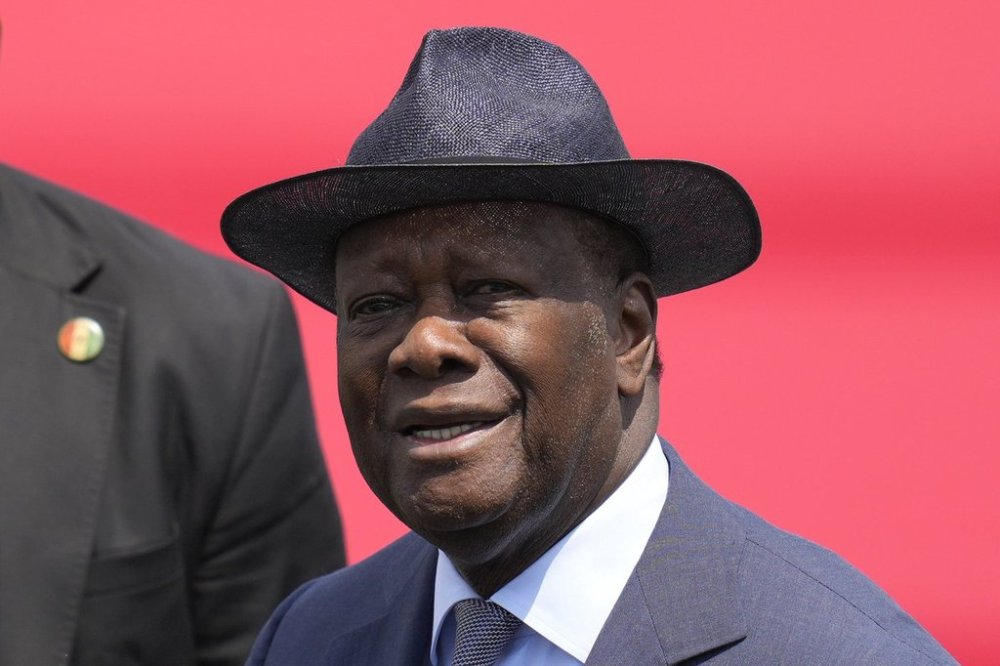Ivory Coast’s president will seek a fourth term after the disqualification of rivals
Advertisement
Read this article for free:
or
Already have an account? Log in here »
To continue reading, please subscribe:
Monthly Digital Subscription
$0 for the first 4 weeks*
- Enjoy unlimited reading on winnipegfreepress.com
- Read the E-Edition, our digital replica newspaper
- Access News Break, our award-winning app
- Play interactive puzzles
*No charge for 4 weeks then price increases to the regular rate of $19.00 plus GST every four weeks. Offer available to new and qualified returning subscribers only. Cancel any time.
Monthly Digital Subscription
$4.75/week*
- Enjoy unlimited reading on winnipegfreepress.com
- Read the E-Edition, our digital replica newspaper
- Access News Break, our award-winning app
- Play interactive puzzles
*Billed as $19 plus GST every four weeks. Cancel any time.
To continue reading, please subscribe:
Add Free Press access to your Brandon Sun subscription for only an additional
$1 for the first 4 weeks*
*Your next subscription payment will increase by $1.00 and you will be charged $16.99 plus GST for four weeks. After four weeks, your payment will increase to $23.99 plus GST every four weeks.
Read unlimited articles for free today:
or
Already have an account? Log in here »
ABIDJAN, Ivory Coast (AP) — Ivory Coast President Alassane Ouattara said Tuesday that he would seek a fourth term leading the West African nation, which is due to hold an election in October.
Ouattara’s candidacy is contested after he changed the constitution in 2016 to remove the presidential term limit.
The 83-year-old president declared his plan in a televised announcement. He won a third term in 2020 after he initially said that he wasn’t going to run again. However, he changed his position following the death of his handpicked successor, Prime Minister Amadou Gon Coulibaly.

“I am a candidate, because the constitution allows me to seek another term, and my health allows it,” Ouattara said.
His most prominent rival, Tidjane Thiam, has already been barred from running by a court on the grounds that he was still a French citizen at the time he declared his candidacy, even though he later renounced his French nationality. Ivorian law bans dual nationals from running for president.
Thiam condemned Ouattara’s decision, calling it “a violation of our Constitution and a further attack on democracy.”
“This president and his government have long since crossed the line,” Thiam said in a statement. “A mock election in October or a ban on peaceful demonstrations will not be enough to cover up this situation.”
Elections in Ivory Coast have usually been fraught with tension and violence. When Ouattara announced his bid for a third term, several people were killed in the ensuing violence. There have been protests against the court’s decision to exclude Thiam from competing in the election.
Ouattara is the latest among a growing number of leaders in West Africa who remain in power by changing the constitutional term limit.
Coup leaders in the region have used alleged corruption within democratic governments and electoral changes as a pretext to seize power, leading to a split in the regional bloc called the Economic Community of West African States, or ECOWAS.
“For those critical of ECOWAS and civilian governments, Ouattara’s decision just reinforces the legitimacy crisis everyone in the region is facing. It makes people like Ouattara look like hypocrites,” Nat Powell, Africa analyst at Oxford Analytica, told The Associated Press.
Ouattara justified his decision to run by saying that the Ivory Coast is facing unprecedented security, economic and monetary challenges that require experience to manage them effectively.
Over the past decade, groups linked to al-Qaida and the Islamic State group have been spreading from the Sahel region into wealthier West African coastal states, such as Ivory Coast, Togo and Benin.
Ivory Coast’s economy has also struggled with U.S. tariffs and climate-related disruptions to its vital cocoa sector. The country is the world’s leading exporter of cocoa beans, and produces more than a third of the world’s supply.
Ouattara’s candidacy drew strong criticism from opposition members.
“Alassane Ouattara does not want to leave power — like any self-respecting dictator,” Guillaume Soro, a former prime minister who was blocked from running in the election, said.
Affi N’guessan, a candidate of the opposition Ivorian Popular Front, called Ouattara’s candidacy “illegal” but said he is confident that “a united opposition will defeat him at the polls.”
___
Ope Adetayo reported from Lagos, Nigeria, and Mark Banchereau from Dakar, Senegal.

